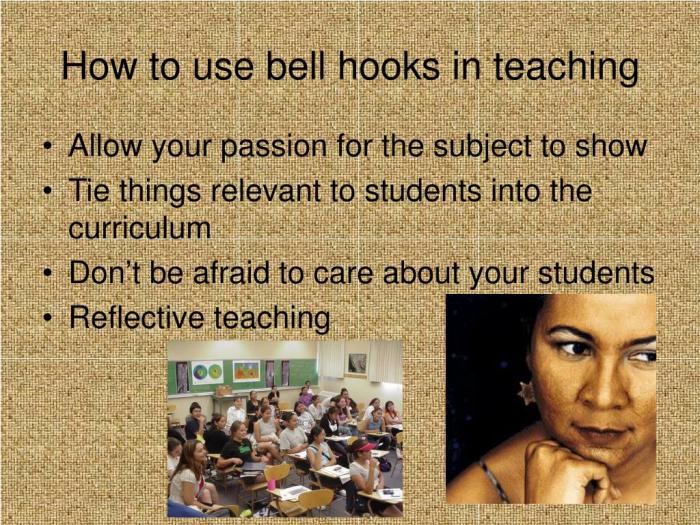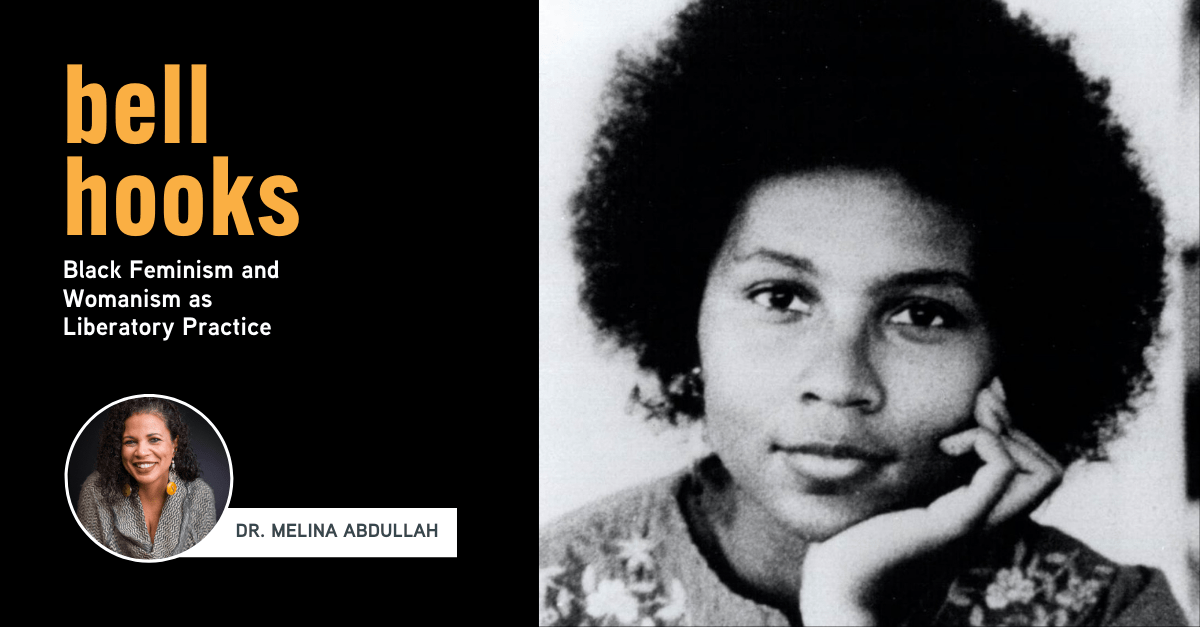Bell hooks theory as liberatory practice – bell hooks’ theory as liberatory practice emerges as a transformative framework that challenges traditional notions of power, oppression, and liberation. Her intersectional approach, emphasizing the interconnectedness of race, class, and gender, has profoundly shaped feminist thought and activism, while her belief in the transformative power of education has inspired countless educators and students.
Through this comprehensive analysis, we delve into the key tenets of hooks’ theory, exploring its implications for personal and collective liberation. We examine her emphasis on self-love, community, and critical thinking, highlighting their role in fostering a just and equitable society.
Key Tenets of bell hooks’ Theory as Liberatory Practice

bell hooks’ theory of liberatory practice emphasizes the intersectionality of oppression and the importance of self-love and community in achieving liberation. She challenges traditional notions of power and oppression by arguing that they are not simply individual experiences but are also rooted in systemic structures.
Intersectionality and Liberation
- hooks argues that oppression is not a single-axis phenomenon but rather a complex web of interlocking systems that affect individuals based on their race, class, gender, sexuality, and other identities.
- Liberation, therefore, requires an intersectional approach that addresses all forms of oppression simultaneously.
Challenging Power and Oppression
- hooks rejects the idea that power is a zero-sum game and argues that it can be shared and distributed more equitably.
- She challenges the dominant culture’s emphasis on individualism and competition, which she argues perpetuates oppression.
Self-Love and Community
- hooks believes that self-love is essential for liberation because it allows individuals to recognize their own worth and value.
- She also emphasizes the importance of community in creating a sense of belonging and support.
Education as a Tool for Liberation

hooks views education as a transformative force for liberation. She argues that education should not simply be about transmitting knowledge but also about empowering students to critically engage with the world and to work towards social justice.
Liberatory Practices in Teaching
- hooks incorporates liberatory practices into her teaching methods, such as creating a safe and inclusive learning environment.
- She encourages students to question authority and to challenge traditional assumptions.
Critical Thinking and Dialogue
- hooks believes that critical thinking and dialogue are essential for fostering liberation through education.
- She argues that students need to be able to think for themselves and to engage in respectful dialogue with others in order to create a more just and equitable society.
bell hooks’ Impact on Feminist Thought and Activism
hooks has made significant contributions to feminist theory, particularly through her focus on race, class, and gender. Her work has influenced feminist movements and activism around the world.
Race, Class, and Gender
- hooks argues that feminism must address the intersection of race, class, and gender in order to be truly inclusive.
- She has written extensively about the experiences of black women in the United States and has challenged the white, middle-class bias of much of feminist theory.
Influence on Feminist Movements
- hooks’ work has influenced feminist movements and activism around the world.
- She has been a vocal advocate for women’s rights, including the right to reproductive freedom and the right to live free from violence.
Intersectionality in Feminism
- hooks’ intersectional approach to feminism has been widely adopted by feminist scholars and activists.
- This approach has helped to broaden the scope of feminist theory and activism and has made it more inclusive of women from diverse backgrounds.
bell hooks’ Influence on Contemporary Social Justice Movements

hooks’ theory has resonated with contemporary social justice movements, including the Black Lives Matter movement and the LGBTQ+ rights movement. Her ideas have been applied to address issues such as racial inequality, LGBTQ+ rights, and economic justice.
Contemporary Social Justice Movements
- hooks’ emphasis on intersectionality has helped to shape contemporary social justice movements.
- Her work has helped to raise awareness of the multiple forms of oppression that people face and has called for a more inclusive and just society.
Racial Inequality
- hooks’ work has been used to address issues of racial inequality, such as police brutality and mass incarceration.
- Her ideas have helped to shape the Black Lives Matter movement and have called for an end to systemic racism.
LGBTQ+ Rights
- hooks’ work has also been used to address LGBTQ+ rights issues, such as marriage equality and transgender rights.
- Her ideas have helped to shape the LGBTQ+ rights movement and have called for an end to discrimination against LGBTQ+ people.
Economic Justice
- hooks’ work has also been used to address issues of economic justice, such as poverty and income inequality.
- Her ideas have helped to shape the movement for economic justice and have called for a more equitable distribution of wealth and resources.
Critiques and Limitations of bell hooks’ Theory: Bell Hooks Theory As Liberatory Practice
hooks’ theory has been critiqued for its focus on individual liberation and its limited attention to systemic oppression and structural inequality. Some critics argue that her theory does not provide a clear path to achieving social change.
Focus on Individual Liberation
- Some critics argue that hooks’ theory focuses too much on individual liberation and does not adequately address the role of systemic oppression and structural inequality.
- They argue that her theory does not provide a clear path to achieving social change.
Limitations in Addressing Systemic Oppression, Bell hooks theory as liberatory practice
- Other critics argue that hooks’ theory does not go far enough in addressing systemic oppression and structural inequality.
- They argue that her theory does not provide a clear analysis of the root causes of oppression and does not offer a comprehensive strategy for dismantling oppressive systems.
Development of hooks’ Theory
- Despite these critiques, hooks’ theory has been influential in shaping feminist thought and activism.
- Her work has helped to raise awareness of the multiple forms of oppression that people face and has called for a more inclusive and just society.
FAQ
What is the central focus of bell hooks’ theory?
bell hooks’ theory centers around the concept of liberatory practice, which emphasizes the interconnectedness of race, class, and gender and their impact on personal and collective liberation.
How does hooks’ theory challenge traditional notions of power and oppression?
Hooks challenges traditional notions of power and oppression by arguing that they are not fixed or inherent but rather socially constructed and maintained through systems of domination and privilege.
What is the significance of self-love and community in hooks’ theory?
Self-love and community are essential elements of hooks’ theory as they provide individuals with the foundation and support necessary for personal and collective liberation.